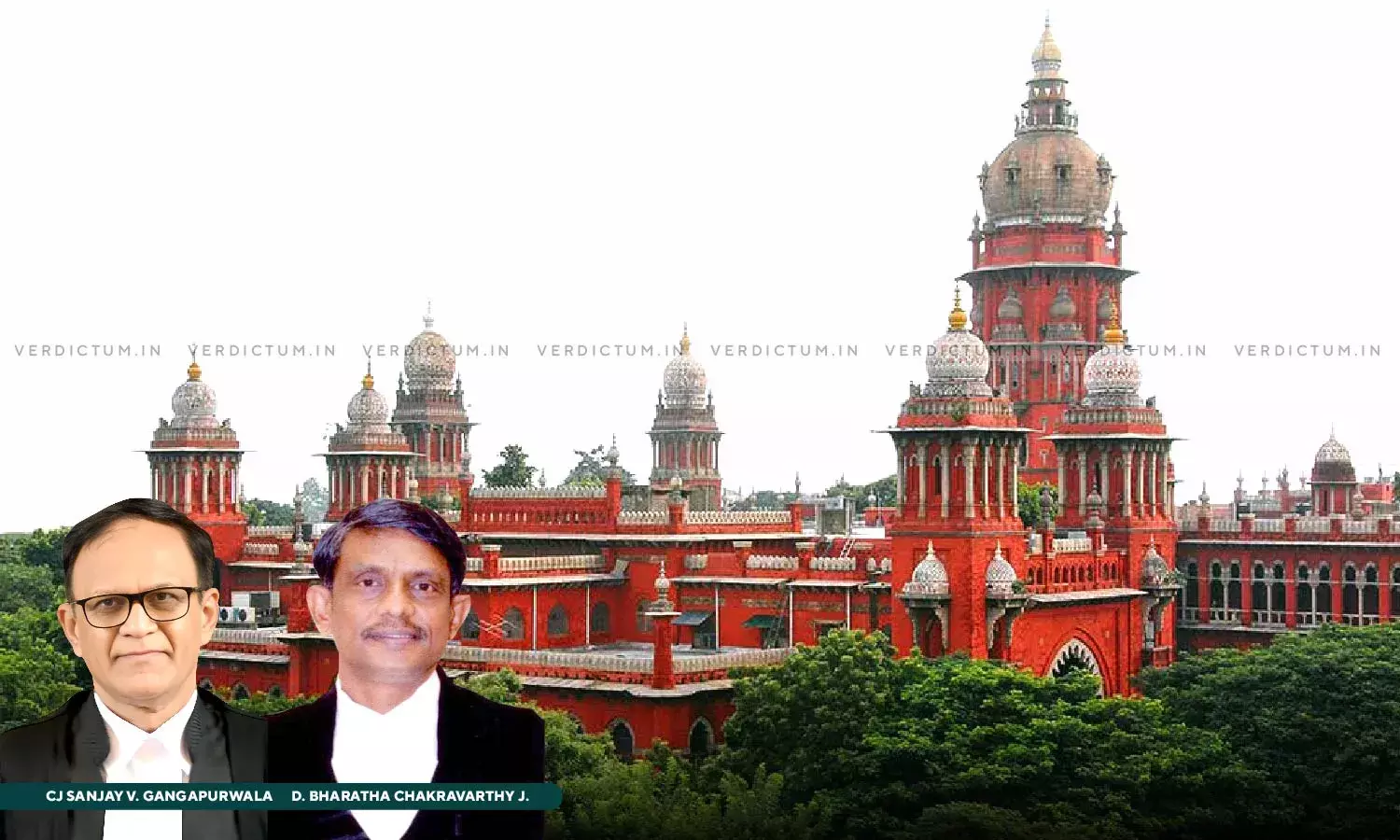Speedy Eviction Of Unauthorised Occupants Is In Public Interest: Madras HC Upholds Constitutional Validity Of Section 6 Of TN Land Encroachment Act

The Madras High Court has upheld the constitutional validity of Section 6 of the Tamil Nadu Land Encroachment Act, 1905 saying that the speedy procedure for eviction of unauthorised occupants of the public property is in public interest.
The court was considering a writ petition seeking a declaration that Section 6 of the TN Land Encroachment Act is null and void for being unconstitutional
A Division Bench comprising Chief Justice Sanjay V. Gangapurwala and Justice D. Bharatha Chakravarthy held, “Apropos the contention of learned counsel for the petitioner that Section 6 of the Act of 1905 is discriminatory, inasmuch as it applies only to the government lands, whereas in case of private lands the parties have to file a civil suit, it needs to be accentuated that an intelligible differentia exists between the occupiers of a public property and the occupiers of a private property. It is in the interest of the public that eviction of unauthorised occupants is made possible through a speedier procedure. The government property can be used for public purpose and an individual cannot be allowed to occupy the same.”
The Bench observed that once the Constitution Bench of the Apex Court has upheld the constitutional validity of the Act of 1905, and more particularly the same provision assailed by the petitioner, it will not be permissible to again consider the challenge to the same.
Advocate M. Elango represented the petitioner while State Government Pleader P. Muthukumar represented the respondents.
In this case, the petitioner sought declaration that Section 6 of the Tamil Nadu Land Encroachment Act, 1905 [for brevity, “the Act of 1905”] is void and violates Articles 14, 19(1)(e) and 21 of the Constitution of India. The counsel for the petitioner, submitted that Section 6 of the Act of 1905 is arbitrary, discriminatory and unreasonable and that the Right to shelter is a fundamental right under Article 21 of the Constitution. It was further argued that the impugned Section 6 of the Act of 1905 takes away the right of residence of the petitioner and other persons and that by virtue of the operation of Article 13 of the Constitution, the impugned Section 6 is deemed to be void.
The counsel also submitted that the Act of 1905 is a pre-constitutional Act and is not in conformity with the fundamental rights guaranteed under Part III of the Constitution. It was argued that the Governor has not granted any approval to the Act of 1905 after the Constitution came into force and that, Section 6 of the Act of 1905 is discriminatory, as it applies only to the government lands, whereas in case of private lands, the parties have to file a civil suit. The counsel said that in a summary manner, eviction takes place under Section 6 of the Act of 1905 and the Revenue Officer can evict a person. The counsel contended that the government cannot be treated differently as the Limitation Act, 1963 applies to the government also and that the right to equality is violated. It was also argued that with the passage of time, the provision has become unreasonable.
The High Court in view of the aforesaid contentions noted, “Once it is found that the petitioner was unauthorisedly occupying the government property and if procedure of law is followed, there is no gainsaying that the petitioner would not be entitled to protection under Article 21 of the Constitution of India. The procedure prescribed is reasonable. … The reliance on Article 13 of the Constitution of India is misplaced. Article 13(1) of the Constitution of India provides that all laws in force in the territory of India immediately before the commencement of the Constitution, insofar as they are inconsistent with the provisions of Part-III of the Constitution of India, shall, to the extent of such inconsistency, be void.”
The Court added that for the purpose of attracting Article 13(1) of the Constitution, the petitioner will have to demonstrate that the Act of 1905 is inconsistent with the provisions of Part III of the Constitution of India and hence, Article 21 of the Constitution of India would not be violated.
“For evicting the unauthorised occupants of the government lands, a special speedy procedure is prescribed under the Act of 1905. The said classification would be reasonable. The legislature in its wisdom has considered the same. … Reliance placed by learned counsel for the petitioner on Article 19(1)(e) of the Constitution of India is too far-fetched. Article 19(1)(e) of the Constitution of India states that all citizens shall have the right to reside and settle in any part of the territory of India. However, the same would not mean to reside and settle in any part of the territory of India unauthorisedly”, said the Court.
The Court further observed that the law would never come to the aid of the person who, without authority of law, unauthorisedly and illegally squats on the property of the government and that a person who unauthorisedly possesses the property cannot be heard to say that he has a constitutional right to unauthorisedly occupy the property.
“The petitioner could not remotely show a semblance of right over the subject writ property. The procedure has been followed while evicting the petitioner”, concluded the Court.
Accordingly, the High Court dismissed the writ petition.
Cause Title- Gunasekaran v. The State of Tamil Nadu & Ors.


